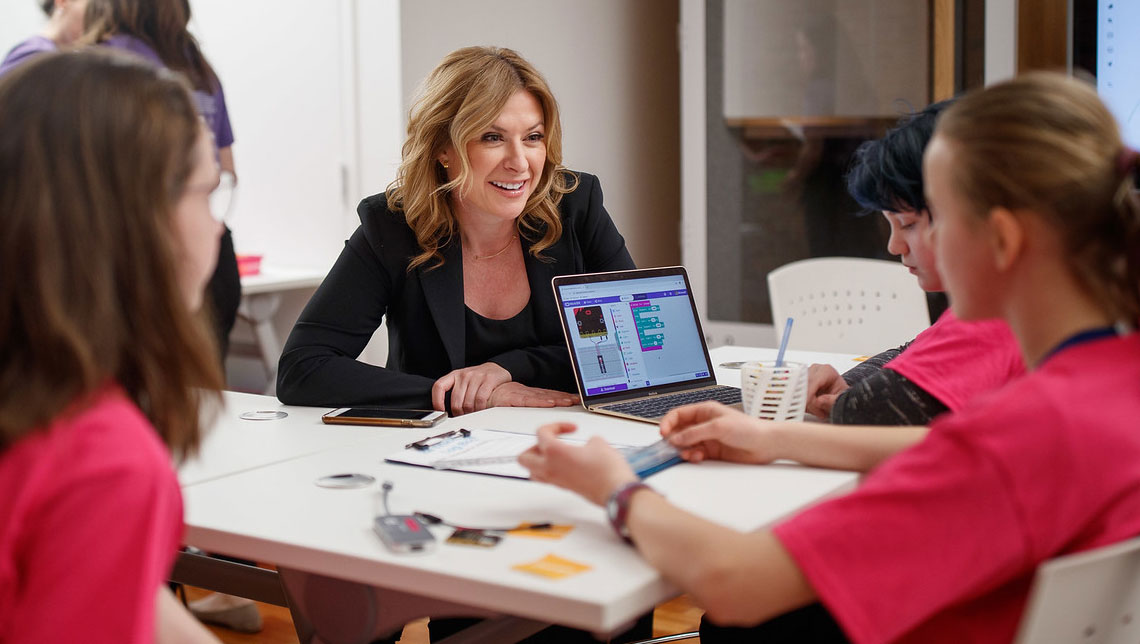Even as an undergraduate at UNB in the 1990s, Jennifer Flanagan (BSc'96) was driven by a goal to make science education more accessible for children, no matter where they lived in New Brunswick, no matter their gender, and no matter what their family circumstances.
Now, two decades later, she is the head of a large, national organization with a vision to transform Canada into a global leader in STEM education — the teaching of science, technology, engineering and math — and to make sure no child is left behind.
Jennifer is the CEO of Actua, a charitable organization based in Ottawa that supports the delivery of STEM programs to 300,000 students across the country each year. Actua represents a network of 43 university and college members and counts major companies like Google and Microsoft, Suncor and RBC, and the Canadian government among its largest partners.
As Canada moves forward with the digital transformation of its economy, the work of Actua has never been more relevant and important than it is today.
"There's a recognition that engaging students in STEM early and often is absolutely critical to our economy. Our economy is based on science, innovation and technology, and it's also critically important to social prosperity in this country. My focus from the beginning has been to support this network of programs across the country, and also bring a very significant social justice priority to the work we do to make sure we are actively removing barriers to participation in this field."
The numbers are impressive: 40,000 Indigenous youth engaged each year by the Actua network; more than six million youth engaged in Canada over the past 25 years; and 43 network members located at universities and colleges, employing 1,000 undergraduates who deliver programming in 500 communities in every province and territory every year.
In terms of gender equity, it is now common to see science undergraduate programs, and even a few engineering programs, with 50 per cent or more participation by women — a huge change from earlier days when women were largely shut out of these studies.
ForJennifer, it is her life's work, and it was first sparked during her time at UNB.
"To do work at a community level and see the impact directly is something that changes the way you approach the world and changes your career trajectory, as it did for me as a student at UNB. Very few people get to experience that and many chase it for much of their career and never find it. I got really lucky."

Jennifer grew up in Fredericton, in a large, supportive family. Her dad was an engineer, her mother "a strong leader," and she always knew she would attend the Fredericton campus of UNB and study science. It was while she was attending UNB and travelled the province as an instructor with UNB's Worlds Unbound program that her eyes were truly opened to the realities of gender inequity and systemic racism.
In her first year at university, Jennifer became involved in Worlds UNBound, an award-winning, bilingual, non-profit program delivered by engineering and science students from UNB. Its goal is to engage New Brunswick youth in STEM and help them realize the possibilities for their own futures especially those who may face barriers.
The first summer that Jennifer was involved in Worlds UNBound, she and seven other undergraduate students travelled to every corner of New Brunswick, to many places she had never visited before. It was her first experience in First Nations communities, her first visit to rural, isolated community locations. It was, she says, "eye-opening and transformative."
"Obviously that was an incredibly formative experience for me. It changed the whole course of my career and my life. I didn't know it at that time, but it is very clear to me now."
She recalls visiting one Indigenous community and admiring the hand-beaded earrings a girl was wearing. She says as they talked about beading, they both realised how important math is to the process. She also understood, for the first time, the depth and beauty of Indigenous culture.
"My experience to that point with Indigenous communities was only through a very systemically racist school system. I did not wholly understand the scope of that until I saw how beautiful and wonderful, and resilient Indigenous culture was from the way it was presented to us. Understanding that changed the course of how I move in the world. Now, more than half of my time, energy and effort goes to Indigenous issues because of those early experiences and my commitment to reconciliation in Canada."
"The other thing that I saw from UNB's perspective is that in a lot of cases, it was the first time many of the kids had interacted with university students. I could see the impact that had. I could see that they could relate to us and I could literally see that their view of what was possible for themselves was changing through participation in the STEM programs."
"That was an incredibly formative experience for me. It changed the whole course of my career and my life. I didn't know it at that time, but it is very clear to me now."
Jennifer fondly remembers one of the early promoters of the Worlds UNBound program – Dr. Monique Frize, the first Women in Engineering Chair at UNB.
"Dr. Frize said, unapologetically, that gender equity was the top priority for the program. All programs would have the same number of girls and boys. Full stop, no exceptions. That was it. Setting a policy like that was met with a lot of push back."
It's a battle in which Flanagan is still engaged. While more women now participate in STEM education and go on to fulfilling careers, many still hit barriers to their participation. Flanagan says old, ingrained prejudices remain a problem, and she now works to ensure girls and women understand it's not their fault.
"We tell them they don't lack the skills, and it's not about their capacities in STEM; it's about the barriers that very much still exist. My advice is to be aware that you will encounter those barriers and look for support where you can to overcome them."
Flanagan says her work these days focuses on achieving policy change, developing solid curriculums provincially, and enriching ecosystems outside of school for kids to experience STEM programming.
"That is certainly what we aspire to. We also know there are many kids in this country who still do not have the same kind of opportunities to participate in educational programming that enriches them and develops their confidence and skills. There are barriers that still exist and need to be removed. Our work will continue until those barriers are gone."







